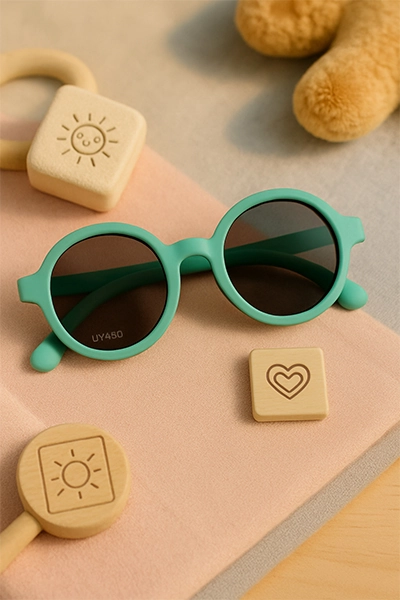
Introduction: Why Children Need Eye Sun Protection
Protecting children's eyes from UV rays is essential from the first years of life. Their eye structure is more vulnerable compared to adults, and damage caused by the sun can be cumulative and permanent. Safe sunglasses are not just an aesthetic accessory: they are an indispensable medical-preventive measure for future visual health.
The Damage of UV Rays on Growing Eyes
More Sensitive Eye Structure in Children
The cornea and lens of children are still developing and allow more ultraviolet rays to penetrate compared to those of an adult. This makes younger children particularly exposed to the risks arising from sun exposure, especially in the early years of life.
Short-term and Long-term Effects: Conjunctivitis, Early Cataracts, Retinal Degeneration
Prolonged and unprotected exposure to UV rays can cause redness, conjunctivitis, and over time, promote the early onset of cataracts or retinal injuries. Clinical studies have shown that UV damage is cumulative and can manifest years after exposure, making prevention even more crucial in pediatric age.
When to Start Using Sunglasses for Children
From Early Childhood: Even Under One Year
Eye protection can and should start from the first months of life. Even infants, if exposed to direct or reflected sunlight, should wear sunglasses with total UV protection, combined with hats with visors.
Importance in Summer Months and in the Mountains
The risk increases during summer and in the mountains, where altitude intensifies the action of UV rays. Even on cloudy days, ultraviolet radiation passes through clouds and can damage children's eyes.
How to Choose Safe Sunglasses for Children
Lenses with 100% Certified UV Protection
It is essential that the lenses provide UV400 protection, meaning blocking 100% of UVA and UVB rays up to 400 nanometers. Only CE certified lenses can ensure this coverage.
Shatterproof and Hypoallergenic Materials
The frames must be flexible, lightweight, and resistant to impacts. The most recommended materials are TR90, medical silicone, or hypoallergenic acetate.
Wraparound Shape and Good Side Coverage
A wraparound frame also protects against lateral radiation. Models that fit well to the face prevent light from entering from above or the sides.
European Regulations and CE Marks: What to Check
Symbols to Look For and What They Mean
Check for the CE marking, which certifies compliance with European regulations. Also check the category of the solar filter (from 0 to 4): category 3 is suitable for very sunny environments.
Why to Avoid Toy or Street Vendor Sunglasses
Uncertified dark lenses worsen UV exposure. The eyes, misled by the reduced light, dilate the pupil, allowing harmful rays to penetrate more.
The Best Brands of Sunglasses for Children
Polaroid Kids, Ray-Ban Junior, Julbo, Nano Vista, Babiators
- Polaroid Kids: polarized lenses and flexible design
- Ray-Ban Junior: baby version of the iconic Ray-Ban
- Julbo: top for sports and mountains
- Nano Vista: shatterproof frames
- Babiators: colorful, lightweight, shatterproof
Prescription Glasses with UV Protection: Double Safety
UV Protection Also in Prescription Lenses
Request UV treatment on prescription lenses as well. They protect without sacrificing optical correction.
Anti-reflective and Blue Light Blocking Treatments for School Use
Ideal for children using tablets and digital devices. They reduce visual fatigue.
How to Get Children to Wear Glasses Naturally
Involve the Child in the Choice
Having them actively participate in the choice encourages acceptance. Choose models with bright colors or themes (cartoons, animals, superheroes).
Glasses with Characters, Colors, and Comfort
Lightweight, soft, and fun frames encourage daily use.
Useful Accessories: Straps, Cases, Solar Clips
To make daily use practical:
- ✅ Elastic straps
- ✅ Hard cases
- ✅ Solar clips for prescription glasses
Common Mistakes to Avoid in Children's Eye Sun Protection
Glasses without Certification
Better no glasses than unverified ones: they can cause more damage.
Do Not Use Adult Glasses on Children
They fit poorly, do not cover well, and are not designed for their physiology.
Pediatrician and Pediatric Optician Advice
When to Consult a Specialist
Vision checks should be done as early as 3-4 years old. A pediatric optician can help you choose the most suitable models.
FAQ
At what age can they wear sunglasses?
From 6 months. Before that, only with mechanical protection (hat, umbrella).
How do I recognize a lens that really protects?
CE marking + UV400 wording. If they are missing, they are not safe.
Are there prescription sunglasses for children?
Yes. All the best brands offer prescription options with UV protection.
Are dark lenses or photochromatic lenses better?
It depends on the use. Photochromatic for mixed use, dark for beach and mountains.
Do they need to wear glasses in winter too?
Yes, especially in the mountains. Snow reflects UV light more than water.
Conclusion: UV Protection for the Little Ones Starts with the Eyes
Preventing today means saving vision tomorrow. Safe, comfortable, and certified sunglasses are the first step in protecting children's visual health. Choose them carefully, make them part of their routine, and ensure they wear them with a smile.